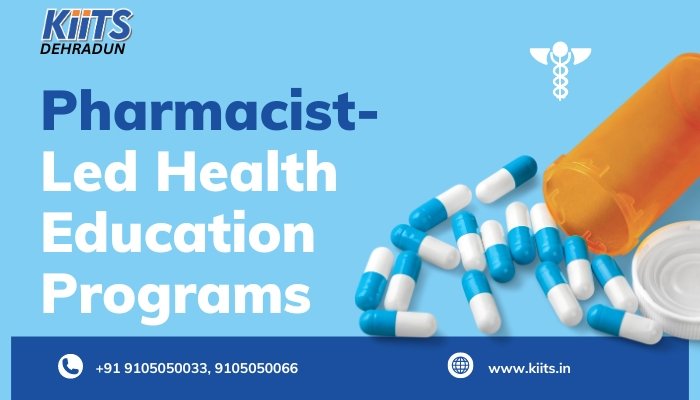Pharmacists play a crucial role in healthcare, extending beyond their traditional responsibilities of dispensing medications and ensuring patient safety. One of the emerging roles of pharmacists is leading health education programs. These programs are designed to educate the public about various health conditions, promote wellness, and improve health outcomes. Pharmacist-led health education programs leverage the expertise of pharmacists to address gaps in healthcare knowledge and provide accessible, reliable health information to communities. This article explores the significance of pharmacist-led health education programs, their benefits, and strategies for effective implementation.
The Importance of Health Education
Health education is a vital component of public health. It involves educating individuals and communities about health-related topics to promote healthy behaviors, prevent diseases, and improve overall health. Effective health education empowers people to make informed decisions about their health and adopt healthier lifestyles.
Addressing Health Literacy
Health literacy is the ability to understand and use health information to make informed health decisions. Low health literacy is a significant barrier to effective healthcare, as it can lead to misunderstandings about medical instructions, poor disease management, and increased hospitalizations. Pharmacists, with their in-depth knowledge of medications and health conditions, are well-positioned to improve health literacy through targeted education programs.
Preventing Chronic Diseases
Chronic diseases, such as diabetes, hypertension, and cardiovascular diseases, are leading causes of morbidity and mortality worldwide. Many of these conditions are preventable through lifestyle modifications and early intervention. Pharmacist-led health education programs can provide valuable information on disease prevention, early detection, and management, helping to reduce the prevalence and impact of chronic diseases.
Promoting Medication Adherence
Medication adherence is critical for managing chronic conditions and achieving positive health outcomes. However, non-adherence to prescribed medications is a common issue that can result in poor health outcomes and increased healthcare costs. Pharmacist-led education programs can address this issue by educating patients on the importance of adherence, providing strategies to improve compliance, and offering support and follow-up.

Benefits of Pharmacist-Led Health Education Programs
Increased Accessibility
Pharmacists are often more accessible to the public than other healthcare providers, as they are available in community pharmacies, clinics, and hospitals. This accessibility makes it easier for individuals to seek advice and participate in education programs without the need for appointments or referrals.
Trust and Rapport
Pharmacists are highly trusted healthcare professionals, and many patients have established relationships with their pharmacists. This trust and rapport create a conducive environment for effective health education, as patients are more likely to engage in discussions and follow recommendations from a trusted source.
Comprehensive Knowledge
Pharmacists possess comprehensive knowledge of medications, drug interactions, and various health conditions. This expertise allows them to provide accurate and detailed information on a wide range of health topics, from medication management to lifestyle changes and disease prevention.
Personalized Education
Pharmacist-led health education programs can be tailored to meet the specific needs of individuals and communities. Pharmacists can assess the unique health challenges and concerns of their audience and design programs that address these issues effectively. This personalized approach enhances the relevance and impact of the education provided.
Collaboration with Other Healthcare
Healthcare Providers
Pharmacist-led health education programs can complement the efforts of other healthcare providers, creating a multidisciplinary approach to patient education. Pharmacists can collaborate with physicians, nurses, dietitians, and other healthcare professionals to provide comprehensive and coordinated education that addresses all aspects of patient care.
Strategies for Effective Implementation
Identifying Target Audiences
To design effective health education programs, pharmacists must identify their target audiences. This involves understanding the specific health needs, demographics, and cultural backgrounds of the communities they serve. Tailoring education programs to address the unique needs and concerns of different groups enhances their effectiveness and relevance.
Selecting Relevant Topics
The selection of relevant topics is crucial for the success of health education programs. Pharmacists should focus on topics that are of high importance to their target audiences and address common health issues. Some topics include:
Medication management and adherence
Chronic disease prevention and management (e.g., diabetes, hypertension)
Healthy lifestyle choices (e.g., diet, exercise)
Smoking cessation
Vaccination and immunization
Mental health awareness
Utilizing Various Educational Methods
Effective health education programs employ a variety of educational methods to engage participants and cater to different learning styles. Some methods include:
Workshops and seminars: Interactive sessions that provide in-depth information and practical tips.
One-on-one consultations: Personalized education sessions tailored to individual needs.
Group classes: Education sessions for groups with similar health concerns.
Printed materials: Brochures, pamphlets, and handouts that provide essential information.
Digital resources: Online articles, videos, webinars, and social media content that reach a broader audience.

Building Partnerships
Collaborating with other healthcare providers, community organizations, and public health agencies can enhance the reach and impact of pharmacist-led health education programs. Building partnerships allows for the pooling of resources, expertise, and networks, resulting in more comprehensive and effective education initiatives.
Continuous Evaluation and Improvement
Continuous evaluation and improvement are essential for maintaining the effectiveness of health education programs. Pharmacists should regularly assess the outcomes of their programs through feedback, surveys, and health metrics. This information can be used to identify areas for improvement, refine educational content, and ensure that the programs remain relevant and impactful.
Promoting Programs
Effective promotion is critical for attracting participants to health education programs. Pharmacists can use various channels to promote their programs, including:
In-pharmacy posters and flyers
Social media platforms
Community events and health fairs
Collaborations with local media
Partnerships with community organizations
Case Studies and Examples
Diabetes Education Programs
Diabetes education programs led by pharmacists have shown significant success in improving patient outcomes. These programs typically include education on blood glucose monitoring, medication management, dietary recommendations, and lifestyle modifications. Participants receive personalized advice and support, leading to better glycemic control, increased medication adherence, and reduced complications.
Smoking Cessation Programs
Pharmacist-led smoking cessation programs offer comprehensive support to individuals trying to quit smoking. These programs provide education on the health risks of smoking, benefits of quitting, and available cessation aids (e.g., nicotine replacement therapy, prescription medications). Pharmacists offer counseling, develop quit plans, and provide follow-up support, significantly increasing the success rates of smoking cessation efforts.

Medication Management Programs
Medication management programs focus on optimizing medication use and improving adherence among patients with chronic conditions. Pharmacists conduct medication reviews, identify potential drug interactions, and educate patients on proper medication use. These programs help prevent adverse drug events, enhance therapeutic outcomes, and reduce healthcare costs.
Vaccination and Immunization Campaigns
Pharmacist-led vaccination and immunization campaigns play a crucial role in increasing vaccination rates and preventing infectious diseases. Pharmacists educate the public about the importance of vaccines, address vaccine hesitancy, and administer vaccines. These campaigns contribute to higher immunization rates, improved public health, and reduced disease outbreaks.
Conclusion
Pharmacist-led health education programs are a valuable addition to the healthcare landscape, addressing gaps in health knowledge, promoting wellness, and improving health outcomes. By leveraging their accessibility, trust, and expertise, pharmacists can effectively educate individuals and communities on a wide range of health topics. Successful implementation of these programs requires identifying target audiences, selecting relevant topics, utilizing various educational methods, building partnerships, continuously evaluating and improving programs, and promoting them effectively. With these strategies, pharmacist-led health education programs can make a significant impact on public health, empowering individuals to make informed health decisions and adopt healthier lifestyles.








